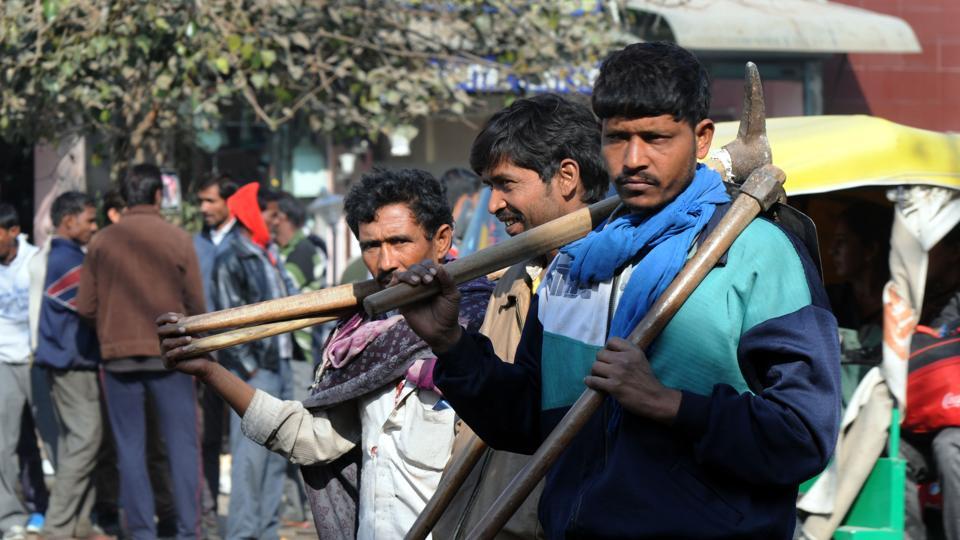prasad1
Active member
Walking or driving past Bristol Chowk in the morning, you cannot miss the large number of people sitting there, waiting to be hired. You will see more than 300 people on a good day. Men wait on one side while the women wait on the other side. This is a common feature in most Indian cities. Labour is needed to build cities and to maintain them. Often, this work is taken for granted and is invisible. They gather each morning before 8am and wait till noon after which those who have not been able to get work disperse. When asked how many succeed in getting hired every day on an average, they shared that about 60% of them got work each day. This leaves 40% who do not get work every day.
All of the people who flank either sides of Bristol Chowk are migrants, with majority from Rajasthan, Bihar, Uttar Pradesh and West Bengal, and some are from Madhya Pradesh, Orissa and Jharkhand.
Migrants support economies in cities around the world. It is important to recognise their contribution rather than see them as outsiders. In Gurugram, there are at least 8 lakh migrant workers, most of them are unskilled workers who get work such as digging earth, carrying heavy loads or construction work at private sites. These are mostly daily jobs and lead to great insecurity.
Most migrant workers in the city live in Nathupur and surrounding areas. While some have their own huts, some live on fixed monthly rent. They do not own property or land back in the village, so they only rely on their daily wage for their survival. Some of them even have to send back remittances to their family in villages. It is a very precarious existence for many of them.
Gurugram is often only seen as this place of high-rise building, underpasses for cars to move fast and glitzy malls. But migrant workers, who remain within a cycle of poverty, are also a reality of this city and all Indian cities.
A large population of migrant workers are domestic workers. You can see many of them cycling around the city early in the morning to reach their place of work.
Gurugram is a deeply unequal and divided city. Migrants provide essential labour that runs the city. So, why is citizenship in a city linked only to ownership of property? Should rights and services not be granted by virtue of the fact of working in a city, building it? How can we ensure that services are available to everyone, that the benefits of growth reach the disadvantaged groups in our cities and migrant workers are recognised for their contributions?

 www.hindustantimes.com
www.hindustantimes.com
All of the people who flank either sides of Bristol Chowk are migrants, with majority from Rajasthan, Bihar, Uttar Pradesh and West Bengal, and some are from Madhya Pradesh, Orissa and Jharkhand.
Migrants support economies in cities around the world. It is important to recognise their contribution rather than see them as outsiders. In Gurugram, there are at least 8 lakh migrant workers, most of them are unskilled workers who get work such as digging earth, carrying heavy loads or construction work at private sites. These are mostly daily jobs and lead to great insecurity.
Most migrant workers in the city live in Nathupur and surrounding areas. While some have their own huts, some live on fixed monthly rent. They do not own property or land back in the village, so they only rely on their daily wage for their survival. Some of them even have to send back remittances to their family in villages. It is a very precarious existence for many of them.
Gurugram is often only seen as this place of high-rise building, underpasses for cars to move fast and glitzy malls. But migrant workers, who remain within a cycle of poverty, are also a reality of this city and all Indian cities.
A large population of migrant workers are domestic workers. You can see many of them cycling around the city early in the morning to reach their place of work.
Gurugram is a deeply unequal and divided city. Migrants provide essential labour that runs the city. So, why is citizenship in a city linked only to ownership of property? Should rights and services not be granted by virtue of the fact of working in a city, building it? How can we ensure that services are available to everyone, that the benefits of growth reach the disadvantaged groups in our cities and migrant workers are recognised for their contributions?

Time to recognise migrants’ role as builders of our cities
Migrants support economies in cities around the world. It is important to recognise their contribution rather than see them as outsiders.
